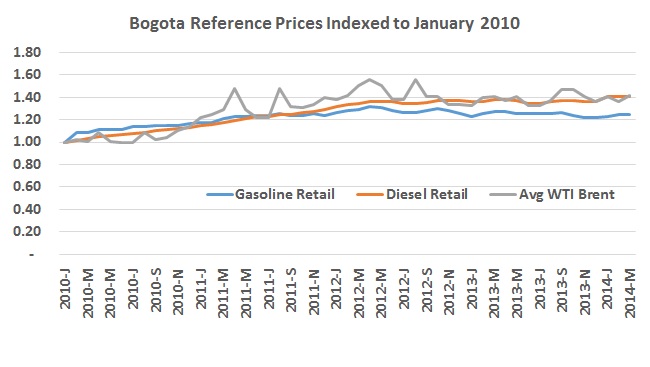
Authorities are considering registering two additional properties as nature reserves, one of which specifically to counteract the possibility of more seismic exploration and exploratory drilling, citing the impact on water resources.

Increases in the WTI oil price and a general trend towards a stronger dollar against the Colombian peso amounts to an increase in gasoline prices this month. Although the government no doubt did what it could to keep them down as the election season heats up.
News of the 250km International Pipeline to connect Colombia to Ecuador’s infrastructure caught Putumayo residents by surprise, and their reactions in local press illustrate the complex challenge which is community and industry relations, and the staunch divisions between regions producing oil and those that watch it pass on the roadways.
Two reports of oil spill have reached local press over the last couple of days, one involving a Perenco owned pipeline in Casanare and the other involving Ecopetrol (NYSE:EC) in Meta.
Colombia’s Minister of Defense Juan Carlo Pinzón has ordered an increase in security measures in Arauca during the run up to elections this Sunday and in light of attacks last week on Unión Patrótica presidential candidate Aída Avella.
GasThe port services holding firm, EL Cayao, of which gas distributor Promigás has a 49.99% share, has won the contract to build a regasification plant for Caribbean thermal energy generation firm Grupo Térmico.
Oil producer Petromont socialized a exploratory drilling project in the Llanos 10 block, where it presented the project to members of 11 villages affected by the drilling in Arauca and Casanare. Environmental authorities were on hand as observers.
The USO says that Ecopetrol (NYSE:EC) continues to hedge and refuse to progress on the modernization of the Barrancabermeja Refinery, with the union saying that it is a must to have a “competitive” and modern refining facility.
Incidents near areas of interest to the oil and gas industry were stable at 39 above recent and long-term averages. Non-Armed Forces-reported incidents were below average both in percentage and absolute terms. This is our indicator of increased guerrilla-initiated activity. However, our 4-week Moving Average incident count was down at 33.3 and the 52 week average was also down slightly at 31.1 incidents per week.
This month we have a number of interviews on a variety of topics.